Everyone expects the no contact rule to always work. This is especially true when it comes to getting an ex back.
Well, I’m here to tell you that while the no contact rule can work for you after a breakup it often doesn’t work the way you are expecting it to. Despite what some people will claim online, no contact will not raise the chances of an ex begging for you back, it’s actually quite the opposite.
And that’s what I’d like to focus today’s discussion around. I want to take real life data from real life people during the no contact and lay some truths on you about how it really works.
I’m going to be talking about,
- Why no contact doesn’t typically work the way you are expecting it to
- What statistics say about how “easy” it’s going to be
- What people get wrong about the time frames revolving around the no contact rule
- What silence tends to really do
- The real point of no contact
Let’s start from the top.

What Are Your Chances of Getting Your Ex Boyfriend Back?
Take the quizThe No Contact Rule Doesn’t Work The Way You Are Expecting It To
Most people, when they hear or read about the no-contact rule, think of it as a period where they’re separated from their ex and essentially ignoring them. The idea is that this will likely make the ex miss them, reach out, and perhaps realize that breaking up was a mistake, and so on.
This concept originates from psychological reactance, a theory that states when a person’s behavioral freedom is restricted, they will react to regain it.
Theoretically, with the no-contact rule, you’re depriving your ex of the ability to talk to you, and according to psychological reactance, they should try to regain that freedom.
However, it’s interesting that when you actually survey people about their experiences with the no-contact rule, the outcomes are often different, especially in the short term. A traditional no-contact period lasts at least a month. We polled our audience about three years ago, asking those who had implemented the no-contact rule whether their ex reached out during this period.
Approximately 64% reported that their ex did not reach out at all.
This suggests that the no-contact rule doesn’t necessarily make your ex miss you initially, at least not in the real world. That’s not to say it can’t eventually lead to this, but there’s a lot happening psychologically behind the scenes, influencing why an ex might not reach out.
One theory I have is that many of our clients’ exes tend to exhibit dismissive-avoidant tendencies.
Dismissive-avoidants often crave what I call the ‘separation elation phase.’ Unlike anxiously attached or secure individuals, they don’t typically mourn the breakup. Instead, they feel excited about regaining their independence.
So, when our clients are practicing the no-contact rule, their exes are likely reveling in this newfound freedom.
It Isn’t Going To Be Easy
So, for many, the no-contact rule is actually a positive experience, providing them with the space and solitude they desire. However, it’s important to acknowledge that implementing the no-contact rule is not as easy as it seems.
While it’s straightforward to read about, the practical application can be quite challenging.
About a year ago, I conducted a poll asking individuals who had attempted the no-contact rule how many successfully adhered to it without breaking.
- Broke It: 34%
- Didn’t Break It: 66%
In the context of the U.S. grading system, this would translate to a failing grade, with only 66% successfully completing it. The difficulty in maintaining this rule stems from various factors.
I believe one significant aspect is that, although the no-contact rule can be a healthy mechanism when focusing on oneself, it also tends to increase cortisol levels.
This separation from an ex can intensify thoughts about them, elevating stress and the urge to reconnect to alleviate this stress source.
Further exploring this, I conducted a poll this year to determine when the no-contact rule starts to feel less challenging.

What Are Your Chances of Getting Your Ex Boyfriend Back?
Take the quizA majority, about 41% of participants, indicated that it became easier around days 14 to 21.
Typically, the first two to three weeks are the most difficult, with gradual improvement thereafter.
However, it’s worth noting that the participants in my polls are those who have engaged with our program, following my guidance and teachings.
This might skew the results, as they are more informed about how to effectively utilize their time during the no-contact period. Without such guidance, I believe most people might struggle more and take longer to find the process easier. T
his assumption extends to the earlier poll about breaking the rule. People not participating in a structured program might tend to break the no-contact rule after just a few weeks when it becomes challenging.
What people get wrong about the time frame of no contact
At Ex-Boyfriend Recovery, we typically focus on three specific timeframes for the no-contact rule:
- 21 days
- 30 days
- 45 days
There are nuanced situational circumstances that might make one timeframe more suitable than another. To simplify, we often tie these timeframes to different attachment styles.
For exes with an anxious attachment style, a shorter no-contact period is advisable.
In these cases, an extended period of no contact might not be beneficial. Therefore, for those with anxious attachment, the 21-day rule is recommended. Conversely, if your ex exhibits a secure attachment style, which is relatively rare in our findings, a 30-day period is ideal. This duration seems to be more beneficial for you rather than for your ex.
For those with a dismissive-avoidant ex, it’s important to allow ample space, which is where the 45-day rule comes into play. The outlier here is the fearful-avoidant attachment style. Interestingly, we recommend a 21-day no-contact period for individuals with this style, treating them similarly to those with an anxious attachment.
The reason for this is due to the unique ‘pendulum swing’ behavior of the fearful-avoidant.
They juggle two core wounds: the anxious fear of abandonment and the avoidant desire for independence.
These conflicting wounds cause them to oscillate between behaviors during and after a relationship. Under the no-contact rule, the anxious core wound – the fear of abandonment – is aggravated.
If this fear is intensified by prolonged no contact, it can push them past a threshold, causing a swing to the opposite end of the spectrum: becoming extremely avoidant and potentially holding a grudge. This could lead to a longer period before they swing back towards their anxious side.
Therefore, we’ve found that shortening the no-contact period and then reaching out yields better results with exes who exhibit fearful-avoidant tendencies.
What Silence Tends To Do During No Contact
A couple of years ago, I created a YouTube video on how to make an avoidant ex miss you.
Our research primarily focuses on exes with dismissive avoidant tendencies.
Interestingly, we found that avoidance often requires giving them ample space. An avoidant is not likely to consider reconciliation until they feel that you have moved on or that there’s no possibility of getting back together. This is when they typically lower their walls, allowing themselves to indulge in nostalgic reverie, which many people aim to achieve.
Theoretically, silence during no contact can particularly foster this response.
However, I don’t believe it directly aids in winning your ex back. Rather, it can place an ex, especially one with dismissive avoidant tendencies, into a state of nostalgic reverie.

What Are Your Chances of Getting Your Ex Boyfriend Back?
Take the quizTo illustrate this point further, I made another video titled ‘I Walked Away and Got My Ex Back,’ emphasizing the importance of genuinely walking away from your ex.
This video, shared within our community, inspired a member to comment on their own experience, which aligns with this concept.
What’s fascinating about this is the real-world validation it provides.
It’s one thing to hear me discuss these theories, but it’s quite another to see them mirrored in someone else’s actual experiences, spanning multiple relationships.
For instance, one individual shared how moving across the country and engaging in exciting new activities in their city created an impression for their ex that they were too absorbed in their new life to consider a reunion, which ironically sparked the ex’s interest in returning.
They also recounted a similar, natural occurrence with a former ex. This happens because the avoidant’s nostalgic reverie is triggered, lowering their defenses. This, in turn, creates an opportunity to rebuild rapport in the manner it should ideally be done.
The Real Point Of No Contact
The real essence of the no-contact rule, I find, is often overlooked by the industry.
While the industry tends to focus on the more alluring aspects of the no-contact rule, such as making your ex miss you or encouraging them to return, these are often the exceptions rather than the rule.
The true purpose of the no-contact rule is to help individuals break free from codependent cycles. This may seem surprising, but we’ve found that the majority of our clients exhibit an anxious attachment style,
And such individuals often find themselves trapped in codependency, where their entire world orbits around getting their ex back.
They approach the no-contact rule as a means to this end, rather than for personal growth.
However, I’ve observed that the key to success in not only moving on but also potentially reconciling with an ex, lies in accepting the possibility that reconciliation may never happen—and being okay with that. Those who embrace this mindset tend to be more successful compared to those who cannot imagine a world without their ex, indicating an unhealthy codependent loop.
My approach involves guiding clients to find purpose beyond their ex during the no-contact period, to discover their own ‘magnum opuses.’
I often discuss the concept of the Trinity, which involves balancing life across three domains: health, wealth, and relationships (excluding the ex).
An effective strategy is to identify a singular purpose that fulfills all elements of the Trinity—something that promotes physical or mental health, generates wealth, and facilitates connections with new, interesting people.
The overarching goal is to shift focus from the ex to a self-chosen, meaningful purpose. Ironically, it is this shift that often lowers the ex’s defenses and makes them more receptive to rapport building once the no-contact period ends. In essence, the real point of the no-contact rule is not just about distancing from an ex, but about reorienting life around a purpose that resonates deeply with one’s own values and aspirations.
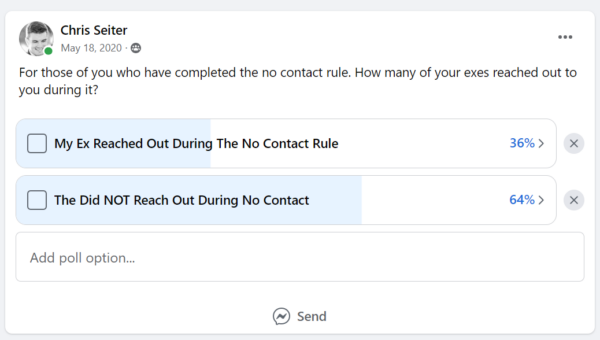
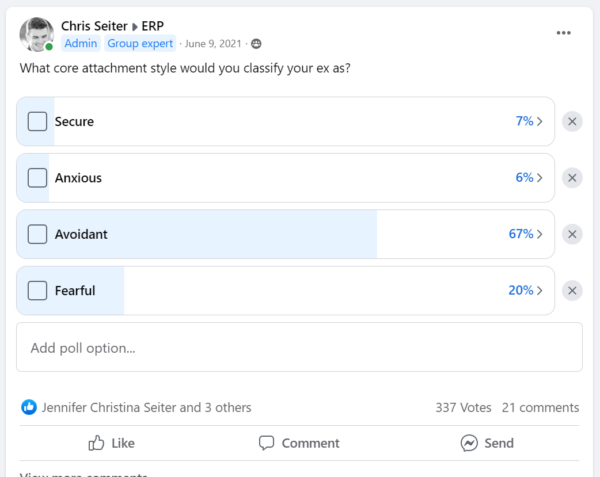
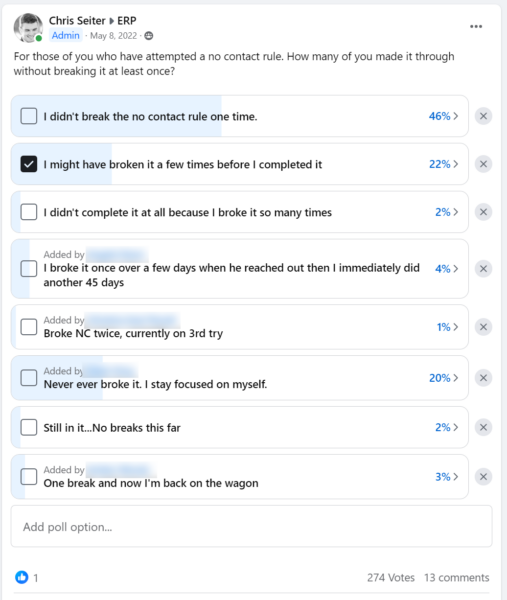
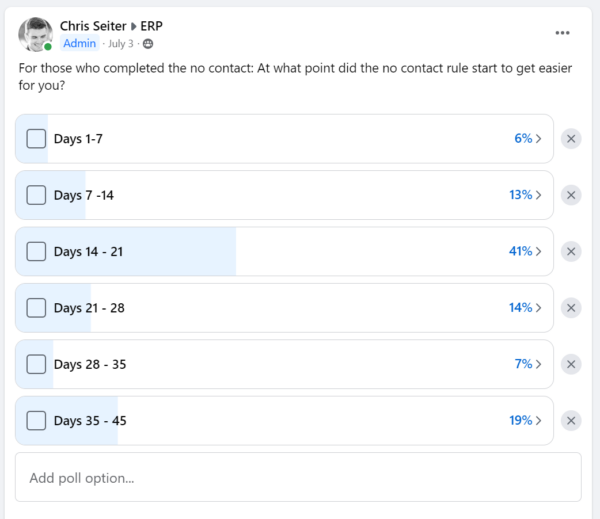

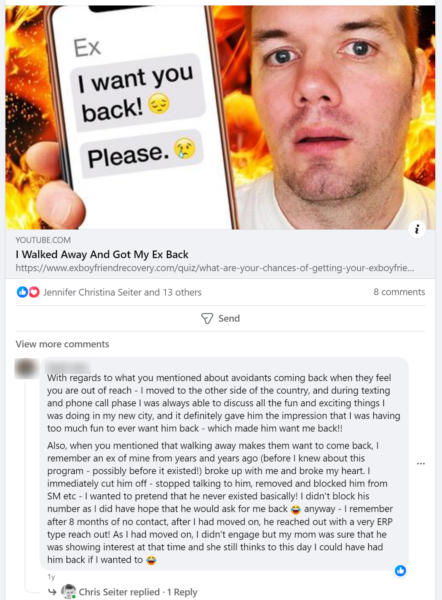
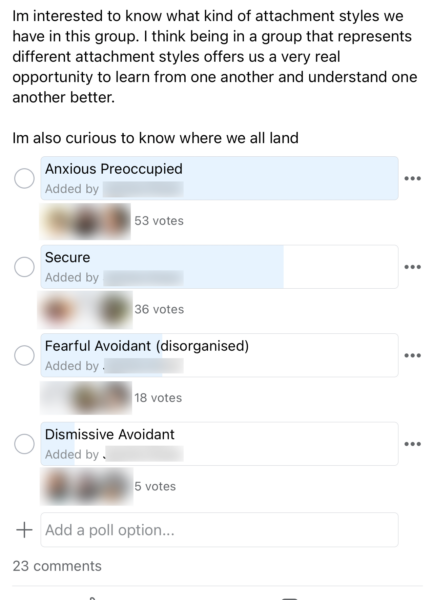
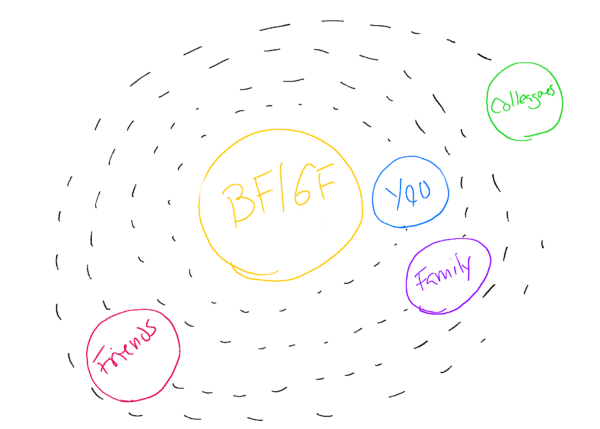
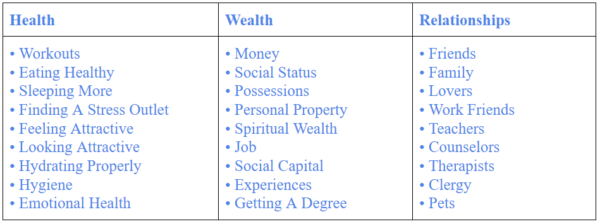
Reply to Rose from Chris
December 14, 2024 at 12:27 am
Your guy has some serious issues and the fact that he’s engaged with another girl while saying he loves you is such a serious breach of your trust and love that you should never forgive.
The sad truth is that he doesn’t value your connection as much as you do and is just using you to feel a connection when he wants.
The fact that he never made any plans for marriage and avoided the topic for many months and especially years despite saying he would marry you, should be all the sign you need that he isn’t serious.
He’s not a good person if he can abuse someones love and trust like that.
Even if he seems like a good person when you talk. He’s probably a narcissist at the very least, pretending to be loving and caring.
I’m sorry you’ve been hurt like that. Nobody deserves that treatment by anyone.
Do yourself a favour and find someone better.
Andrew Robinson
December 6, 2024 at 6:21 pm
I have read what you wrote and it’s absolutely true am going through a no contact rule at the moment but am using it to improve on myself and behaviours since I found out I have insecure and anxious attachments issues and I need work on to be on the same wavelength on listening and responding aswel that’s what am going to work on to improve on myself so I don’t make the same mistakes time after time again. Kind regards mr Andrew Robinson
Rose
July 30, 2024 at 7:00 am
Hi my situation is complicated please help me.
I met this british guy online on 2008 and i live in middle east, we kept talking EVERYNIGHT for 2 hours on skyppe all these years untill october 2023, and he kept saying he loves me and wants to marry me and would come to my country to marry me but everytime i asked him when he would come he changed the topic, on march 2023 he said he has a new job which won’t be online for 12 days, but he texted me everynight saying he loves me, then in august he said he has a new job for 4 weeks can’t be online and still sent me text everynigh saying he loves me. and when i told him what is this job he really talked bad and angry to me and said i don’t need to know, and he NEVER added me on his facebook he has 305 privated pictures in his facebook and only a few pictures are public.
anyway on october i noticed he smokes weed, i told him that i can’t accept it, and he said ok goodbye and goodluck, i took it as an insult and i said ok, and didn’t reply him anymore, after two days he sent me a text asking me if i ever get online, i told him i do not have any motivation to have a relationship with you, he said ok then don’t you ever speak to me again! two weeks later i saw his status in facebook was changed to ENGAGED. I asked him about it and he denied and said it’s fake!
but he sent texts on and off and i replied hoping we would be back together cos i love him, but he never came back to me even when i asked him directly to get back he didn’t reply.
Anyway in may 2024 i was checking his facebook and saw a woman from philipine sent him a comment saying she misses him! I checked her profile and saw that she got engaged with her in august 2023 when she went to britain to visit him, she went once in march 2023 and once in august 2023 !
I sent him a message and told him and he denied but when i sent him their pictures together, he said he didn’y cheat on me and it’s because i left him , while he got engaged on august and i left him on october.
Then i didn’t reply him anymore. He sent a few messages every 7-8 days and i didn’t reply and he sent another message saying he has a new phone number and i replied and said give it to your wife !
then he didn’t reply for 23 days then he sant me a messsage saying he still loves me and wants to marry me and that he is not engaged.
While his status on facebook was still engaged and i saw in her facebook that she still wears the ring and despite she is now in philipine they are planning to get married within this year, i told him all and he didn’t reply again, after 10 days he again said he loves me and is not engaged.
I told him i loves him too and want to marry him too but not as long as she is in his life…
he never replied after 20 days he sent me his new number, i decided to go no contact, so i never replied or save his number, then the day after he sent another email asking if i got his new number and still i was silent, it’s now day 5 and no messages from him,
do you think anything will be fixed ? or something? or he is just playing with me ? or what ? how many days for no contact for this situation ?
Shauna
June 14, 2024 at 6:24 pm
Me and my boyfriend broke up about four months ago because somebody went and told him that I was doing things I wasn’t so he left in the middle of the night goes by then he comes back for two days and then he leaves again. I haven’t talk to him, he has me blocked on Facebook but he does not have my number blocked. We do have kids together. I make everything just about the kids. When do I reach out to him? No contact again we’ve been separated for about four months.